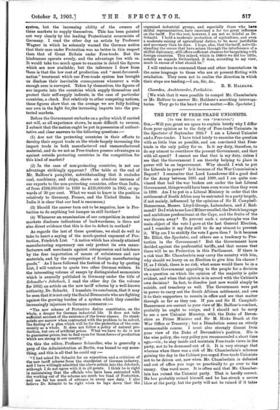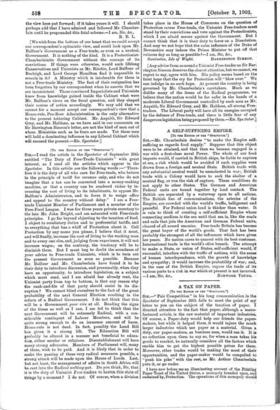THE DUTY OF FREE-TRADE UNIONISTS.
[To TH2 EDITOR OP TUB "SPICTAT0R.1 Si,—Will you grant me space td explain briefly why I differ from your opinion as to the duty of Free-trade Unionists in the Spectator of September 26th ? I am a Liberal Unionist and a Free-trader. I have tried lately to examine the question with as little bias as possible, and am convinced that Free- trade is the only policy for us. Is it my duty, therefore, to do my utmost to overthrow the present Goiermient, and that with all speed? I cannot see that that is my duty, unless I see that the Government I am thereby helping to Plaee in power will be an improvement. Why should I wish to put the Liberals in power? Is it because of the War Commission's Report? I remember that Lord Lansdowne' did a good deal for the Army between 1895 and 1899, and I am quite 'Con- vinced that had the war broken out under the last Liberal Government, things would have been even worse than they were in 1899. Am I to put in a Liberal Ministry in order that the settlement of South Africa may be entrusted to a party largely, if not mainly, influenced by the opinions of Sir H. Campbell- Bannerman, Messrs. Lloyd-George, Labouchere, and J. Red- mond? Do I wish to see Lord Milner recalled, the Dutch language and ambitions predominant at the Cape, and the fruits of the war thrown away ? To prevent such a' catastrophe was the main object of the vote I gave at the last General Election, and 'I consider it my duty still to do my utmost to prevent it. Why am I to stultify the vote I gave then?' Is it because Mr. Elliot, the Spectator, and others see a tendency to Pro- tection in the Government ? But the Government have decided against the preferential tariffs, and that means that there will be no Protection in this Parliament. If there is a risk that Mr. Chamberlain may, carry the country with him, why should we hurry on an Election to give him his chant*? If, as I think, there is no risk, what sense would there be in a Unionist Government appealing to the people for a decision on a question on which the opinion of the majority is quite evident, and when that opinion is in accord with the Cabinet's own decision? In fact, to dissolve just now would simply be suicide, and treachery as well. The Government were put in power to carry out the South African settlement, and owe it to their supporters to remain in office and see that matter through as far as they can. If you and Sir H. Campbell. Bannerman are correct in your view of Mr. Balfour's conduct, probably be ought to resign, and I should not be sorry to see a new Unionist Ministry, with the Duke of Devon- shire as Prime Minister and Sir M. Hicks Beach at the War Office or Treasury ; but a Dissolution seems an utterly unreasonable course. I must also strongly dissent from your view of the Duke of Devonshire's position. His • is the wise policy, the very policy you recommended a short time ago,—viz., to stay inside and maintain Free-trade views in the party, not to be drummed out of it. It is very strange that whereas when there was a risk of Mr. Chamberlain's schemes gaining the day in the Cabinet you urged Free-trade Unionieta not to be driven out, now when Mr. Chamberlain is defeated and out of 'office you urge us practically to go over 'to' the enemy. One word more. It is often said that Mr. Chamber- lain has ruined the Unionist party. That is hardly correct. He lms probably ruined himself, and he has struck u severe blow at the party, but the party will not be ruined if it tak,es
the view here put forward ; if it takes yours it will. I should perhaps add that I have admired and followed Mr. Chamber- lain until he propounded this fatal scheme.—I am, Sir, &c., R. B. L.
[We wish from the bottom of our heart that we could accept our correspondent's optimistic view, and could look upon Mr. Balfour's Government as a Free-trade, or even as a neutral, Government. It is nothing of the kind. It is a Protectionist- Chamberlainite Government without the courage of its convictions. If things were otherwise, would such lifelong Conservatives and Unionists as Mr. Ritchie, Lord Balfour of Burleigh, and Lord George Hamilton find it impossible to remain in it P A Ministry which is intolerable for them is not a Free-trade Ministry. The fact of their resignation has been forgotten by our correspondent when he asserts that we are inconsistent. Those convinced Imperialists and Unionists knew from knowledge gained inside the Cabinet what were Mr. Balfour's views on the fiscal question, and they shaped their course of action accordingly. We may add that we cannot for a moment accept our correspondent's view that a Home-rule, Pro-Boer Administration is the only alternative to the present tottering Cabinet. Mr. Asquith, Sir Edward Grey, and Mr. Haldane, as we have said in our comments on Sir Barrington Simeon's letter, are not the kind of men out of whom Ministries such as he fears are made. Yet these men will hold a dominating influence in any Liberal Cabinet which will succeed the present.—ED. Spectator.]



























































 Previous page
Previous page